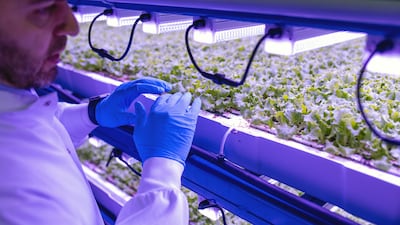A fund set up by the US and UAE to promote climate-friendly innovation in agriculture and the food sector has more than doubled to $17 billion.
More than 600 government and non-government partners have now pledged their support for the Agriculture Innovation Mission (AIM), which was launched by the two countries in 2021, it was announced at Cop28.
The cash injection is about double the total of $8 billion that was pledged when Cop27 took place in Egypt last year.
"We are witnessing tremendous progress in transforming the global food and agricultural systems at Cop28, which has placed the theme at the heart of the presidency agenda," Mariam Al Mheiri, Minister of Climate Change and Environment, said.
Minister of Climate Change and Environment
She added that "the world has rallied together" to implement the Cop28 UAE Declaration on Sustainable Agriculture, Resilient Food Systems and Climate Action, with 134 nations plus non-state partners in support.
"The significant traction gained by AIM for Climate is another step in promoting climate-smart agriculture, driven by innovation and advanced technology, which is critical to strengthening productivity and building sectoral resilience," Ms Al Mheiri said.
Of the $17 billion invested, a total of $12 billion comes from governments, among them those of Bahrain, Bangladesh, Canada, Germany, Honduras, Israel, Mexico, Morocco, the Netherlands, Philippines, Singapore, US, UAE, UK and Vietnam.
A further $5 billion comes from what are termed innovation sprints, which are initiatives led and self-funded by partners "to achieve expedited results in agricultural and food systems innovation".
___________________________________________
Indigenous people call for change at Cop28 - in pictures
There are now 78 of these, more than twice as many as were announced at Cop27, and they align with priorities such as emerging technologies, agroecological research and methane reduction.
The total number of partners supporting AIM for Climate is now more than 600, including businesses, academic institutions, not-for-profits and think tanks, as well as governments.
Ms Al Mheiri said in the UAE "there are a lot of things we have to change with behaviour and habits" around food, particularly in terms of waste.
"We’re throwing too much food into the bin," she said. "It’s really important every bit of edible food does not end up in landfill."
She said efforts to reduce food waste in the UAE included "a lot of interactions with schools", adding that she herself had to "start reflecting on what I’m doing as a person" with respect to food.
Consumers were being "nudged" to be more climate-smart in terms of their eating habits, she said, such as by being shown photos with examples of smaller portion sizes.
"There’s a lot we have to do with consumer behaviour," she added. "This will have to be ongoing. It’s not a six-month plan. This is a vision of changing habits."
Tom Vilsack, the US Secretary of Agriculture, announcing the increase in funding alongside Ms Al Mheiri, said that the US, UAE and global partners, were "dedicated to meeting our climate goals, enhancing food security and building a sustainable future".
"This partnership embodies our shared commitment to accelerating investments in transformative food systems and climate-smart agricultural innovations and we look forward to working with everyone on the road to Cop30," he added.
"Our joint efforts are not just about climate-smart agricultural advancements but about nurturing ambition, catalysing action, and fostering hope towards a more sustainable, resilient, and prosperous world for all.”
Mr Vilsack said agriculture has an opportunity to reach net zero "quicker than some of the other industries".
"The ability to have access to soil, land as a strategy to sequester carbon. The ability to have partners with major agriculture companies, major universities, allows the farmers to embrace climate-smart practices," he said at a press conference.
He said a challenge was asking farmers to embrace technology that had a cost to them, but said this could be overcome by showing that retailers could charge more for food produced in a way that has reduced impact on the environment.
AIM for Climate was launched at Cop26 in Glasgow in 2021 with an initial announcement of $4 billion of funding.
Decarbonising agriculture is seen as crucial to the world meeting its climate goals, because the agro-food system is responsible for as much as 34 per cent of greenhouse gas emissions when changes in land use – such as the replacement of forests by agricultural land – are taken into account.



